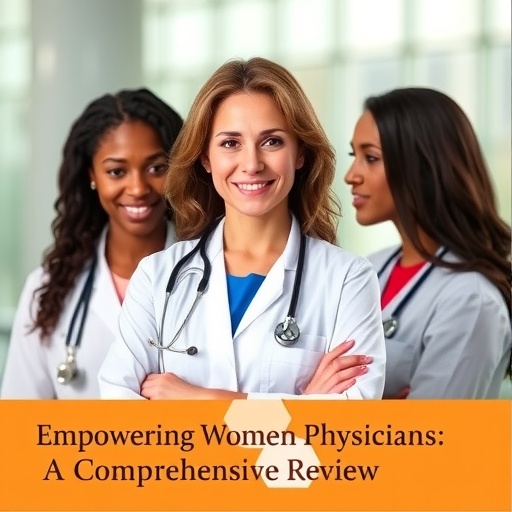In recent years, the conversation surrounding the work-life balance of women physicians has gained significant traction. As healthcare systems evolve and the demands of patient care increase, the unique challenges faced by women in the medical field have become increasingly apparent. A systematic review by Kelly et al. in the Journal of General Internal Medicine sheds light on the various initiatives aimed at supporting the homelife of female physicians. This review underscores the urgent need for systemic changes in how healthcare environments accommodate the specific needs of women in medicine, particularly as they juggle demanding careers alongside familial responsibilities.
The review meticulously analyzes a range of programs and policies designed to enhance the work-life balance for women physicians, highlighting successful case studies and identifying gaps that warrant further research. Women make up a growing proportion of the physician workforce, yet they often encounter obstacles that their male counterparts do not face on the same scale. The societal expectations of caregiving, combined with the rigid structures of medical practices, create a unique set of stressors that can lead to burnout and professional dissatisfaction.
One notable finding from the systematic review is the lack of comprehensive policies that address these challenges. While some institutions have adopted measures to promote flexible working hours or provide childcare support, these initiatives are not consistently implemented across all healthcare settings. This inconsistency not only perpetuates the challenges that female physicians face but also discourages retention in the profession. It is imperative that more healthcare organizations recognize these disparities and work towards creating a more equitable environment for all physicians.
The review also highlights the role of mentorship and peer support in helping women navigate the complexities of their professional and personal lives. Connecting with other women who have faced similar challenges fosters resilience and empowers female physicians to advocate for themselves within their workplaces. Furthermore, the study suggests that mentorship programs can be instrumental in promoting career advancement for women in medicine, allowing them to ascend to leadership roles where they can influence positive change on a larger scale.
Moreover, the systematic review emphasizes the importance of institutional buy-in for any initiative to be effective. Leadership within healthcare organizations must prioritize the implementation of supportive measures for women physicians. This involves not only developing policies but also ensuring that the organizational culture actively promotes participation in these initiatives. Without a committed approach from the top levels of administration, even the best-designed programs may fall short of achieving their desired impact.
In considering possible solutions, the review suggests that healthcare institutions can benefit from evaluating their current policies through the lens of gender equity. This evaluation should include feedback from female physicians at all levels of the organization, allowing them to voice their specific needs and recommendations. By fostering an inclusive dialogue, healthcare systems can develop targeted strategies that effectively address the unique circumstances of women in medicine.
Furthermore, the systematic review calls for ongoing research to expand knowledge on the intersectionality of gender, race, and care responsibilities in the medical field. Understanding how these factors interact with one another is essential for developing effective initiatives that truly support the diverse experiences of women physicians. As research continues to evolve, it will be crucial for healthcare leaders to remain informed about emerging best practices in order to implement meaningful changes.
In examining geographical variances, the review indicates that some regions are more progressive than others concerning policies aimed at aiding women physicians. Institutions in urban areas, for instance, may offer more robust childcare facilities and flexible working arrangements compared to those in rural settings, where such resources are limited. This disparity begs the question of how we can ensure equitable access to support initiatives for women physicians, regardless of their geographical location.
As we venture further into a post-pandemic world, the conversations surrounding work-life balance and the well-being of healthcare providers have been amplified. The COVID-19 pandemic has exacerbated existing issues, and this pivotal moment presents an opportunity to rethink how healthcare systems operate. The insights garnered from this systematic review provide a blueprint for navigating these complexities, ensuring that the needs of women in medicine are not overlooked as we restructure our approach to healthcare delivery.
The systematic review by Kelly and colleagues serves as a critical reminder that supporting women physicians is not just a matter of individual well-being, but a fundamental aspect of cultivating a healthier, more effective healthcare system. By recognizing the pivotal role that women play within this field, we can begin to dismantle barriers and create an environment that promotes not only their success but ultimately, the success of the healthcare industry as a whole.
In closing, the recommendations outlined in the review call for a multi-faceted approach to create meaningful change. Enhanced collaboration between stakeholders, including educational institutions, healthcare organizations, and policymakers, is essential in crafting a future that prioritizes the holistic well-being of women physicians. This collaborative spirit will pave the way for a new era in healthcare, one where the contributions of female physicians are fully acknowledged and integrated into the socio-cultural fabric of medicine.
As advocates of change, it is our responsibility to amplify these voices and drive forward the initiatives necessary to create a more inclusive healthcare landscape. By investing in the homelife of women physicians, we can ensure the future of medicine is equitable, sustainable, and reflective of the diversity within our communities.
Subject of Research: Support initiatives for the homelife of women physicians.
Article Title: Initiatives to Support the Homelife of Women Physicians: A Systematic Review.
Article References:
Kelly, C.J., Hempel, S., Zhang, D. et al. Initiatives to Support the Homelife of Women Physicians: A Systematic Review. J GEN INTERN MED (2025). https://doi.org/10.1007/s11606-025-09972-y
Image Credits: AI Generated
DOI: https://doi.org/10.1007/s11606-025-09972-y
Keywords: women physicians, work-life balance, healthcare system, mentorship, gender equity, systemic change




